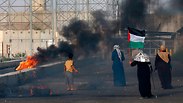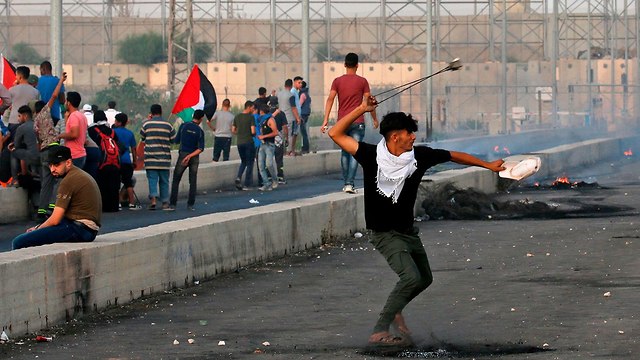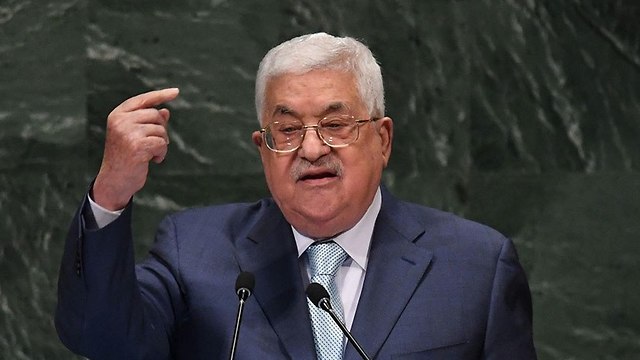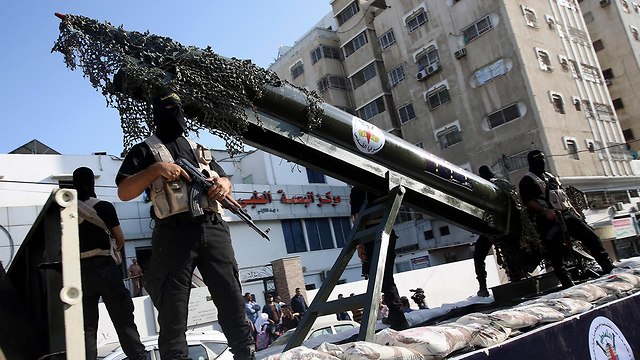
Hamas testing the limits, Abbas intransigent
Analysis: The talks between Hamas and Egypt on an arrangement with Israel are at a dead end, and pessimism abounds. Abbas persists with his threats and tensions are rising. With such a complex situation, it's difficult to know where he's heading.
So why is Cairo still investing efforts in what appears to be a lost cause? The reason is rooted in things happening under the surface that the Egyptians are not giving public expression to, which are indirectly tied to the escalation on the Israel-Gaza border over the last month.
The Egyptians are trying to implement moves meant to calm down the tensions, and there are indications Cairo might be considering focusing on ceasefire talks between Israel and Hamas and abandoning—at least at this stage—the reconciliation efforts. There are two reasons for that: one, the futility of the reconciliation efforts; the second and more important reason is that Egypt feels Israel and Gaza are drawing dangerously close to an escalation.
Does Gaza share the Egyptian assessment about the chances of reaching a full-blown military conflict in the strip? Apparently not. Hamas believes that at this point Israel wishes to avoid a military conflict in Gaza because of the tensions on the northern border facing the Iran-Syria-Hezbollah axis, and so the terror organization allows itself to test the limits and escalate the violence on the border.
The card Hamas is currently playing is its "Deception Unit," which is responsible for the violent clashes on the border every evening under the cover of darkness. The unit's name is no more than language laundering in and of itself. In reality, the "Deception Unit" is led by Hamas's military wing. And what is the organization's next card? The "Al Dabab (fog) Unit," which will take advantage of the coming winter weather to approach the border fence under the cover of fog and sabotage it.
Hamas's greatest enemy: Abbas
In this delicate puzzle there's also one player who made himself very significant: Mahmoud Abbas. Hamas has no bigger enemy at the moment. His threat—that any agreement signed without the Palestinian Authority and that is limited to Gaza will lead him to completely halt the PA's monthly aid to the strip—is causing commotion in Gaza.
Israel hasn't given much attention to this issue, but the Palestinian president raised this threat again on the world stage at the UN General Assembly last week. While Israel mostly focused on the part of his speech in which he sends his warm greetings to shahids (martyrs) and prisoners—the conversation in the Gaza Strip and the West Bank has been solely focused on the threat to impose more sanctions on Gaza.
The PA's monthly aid to Gaza currently stands at $96 million, and there is currently no international player who could guarantee a $100 million check to the strip every month. If anyone in Israel thinks that by cutting the PA's tax money it would be possible to provide Gaza with the sum it needs to keep its head above the water, he should think again. Israel collects an average of $10 million in taxes for the Palestinian Authority. It's a little over 10 percent of the strip's monthly budget, and so it is no more than a few drops in Gaza's salty sea.
Hamas has contingency plans in case Abbas makes good on his threat. One of the possibilities being examined is expelling all of the PA employees from the Gaza Strip, including those operating the border crossings. Hamas will then face two options: one, a complete closure of the Kerem Shalom crossing with Israel, through which goods come into the strip, and copying its model to the Rafah crossing (and, to that end, Hamas has already built a fuel terminal on the Palestinian side of the Rafah crossing). The second option is to bring in "civilian" companies to operate the crossings, to serve as a buffer between Israel and Hamas.
Will Egypt choose the arrangement path to prevent a military conflict in Gaza even at the expense of a divorce between the Palestinian Authority and the Gaza Strip? Will this in turn lead Abbas to make good on his threat, which would necessarily increase the chances of a war between Israel and Hamas? The international community is also concerned, and therefore in recent days international players have been sending Ramallah messages through several different channels saying that if Abbas cuts the funds to Gaza, they in response will cut the donation funds meant for the Palestinian Authority.
Will this threat achieve its goal? Abbas in 2018 is an unpredictable man, intransigent and uninhibited. And so, when possessing all pieces of this puzzle, it's possible to understand why it's so difficult and complex to assess where we're headed in the days and weeks to come.













